TEMPO.CO, Jakarta - Singapore has just concluded its general election campaign on Thursday, May 1, 2025. The General Election will take place on Saturday, May 3, 2025. Eleven political parties in the country have nominated their candidates for parliament members in 33 electoral divisions before the voting day. These parties will vie for the votes of 2.67 million registered voters.
This year's Singapore General Election takes place against increasing global trade tensions, reminiscent of the Trump era, challenging the core of Singapore's economic identity. As a trading hub with trade volume approximately three times its GDP, Singapore faces real risks from a global trade contraction caused by tariff disputes.
Singapore's Electoral System
According to the Elections Department Singapore, general elections in Singapore must be held within three months after the first sitting of Parliament's five-year term, even if the Prime Minister can call for an earlier election. The Singapore Parliament is unicameral with a single chamber, and the 2025 general election will elect 97 seats.
The electoral divisions consist of Single Member Constituencies (SMC) and Group Representation Constituencies (GRC). There are 15 SMCs and 18 GRCs in the 2025 election. SMCs elect one Member of Parliament (MP) per constituency, while GRCs elect between three and six MPs, with at least one MP from the Malay, Indian, or other minority communities. Candidates in GRCs must be from the same political party or stand as independent group candidates.
Voters must be at least 21 years old to cast their votes. The election process begins with PM's announcement of electoral divisions number, based on the recommendations of the Electoral Boundaries Review Committee.
An election is held if there is more than one candidate in SMC or a group in GRC. Otherwise, the candidate is deemed elected without voting. The formal notice of contested election includes the polling day, candidate information, and polling station locations.
The 2025 general election will be the 14th general election since Singapore's independence and the first without the participation of Lee Hsien Loong as the leader of the People's Action Party (PAP), succeeded by Lawrence Wong as the Prime Minister and party secretary-general. This election also marks a political contest amidst significant global and domestic challenges.
Competition Among Major Parties
The People's Action Party (PAP), which has been in power since 1959, will usher in a new leadership generation, known as the ''Fourth Generation'' (4G), under Prime Minister Lawrence Wong's leadership.
In the recently concluded campaign, PAP made the global trade tension its main theme. However, according to analysis from the Lowy Institute, a Sydney-based think tank, many voters burdened with more pressing economic pressures may not prioritize that issue highly.
As reported by Malay Mail, PAP promised financial support for those who lose their jobs (up to S$6,000 for six months), vouchers and discounts to help with living expenses, 13,600 new healthcare beds in five years, and over 50,000 new public housing units for the community within three years.
The Workers' Party, led by Pritam Singh, currently holds 10 parliamentary seats. Their proposals include exempting necessities from consumption tax, increasing the contribution from reserves for fiscal policy to 60 percent, implementing redundancy insurance, and offering public rental housing for 70 years.
The Progress Singapore Party, formed by Tan Cheng Bock in 2019, aims to reduce consumption tax, allow citizens to buy public housing without land cost, urge the government to procure and distribute medications, and implement a minimum wage of S$2,250 per month.
The Singapore Democratic Party, led by Chee Soon Juan, advocates for a social liberal agenda. Their key policies include reducing consumption tax, introducing non-open market public housing, and building a universal national health insurance system with a single payer.
Historically, PAP has never received less than 60 percent of the vote, and a decrease below this threshold would be a significant warning sign for the party.
PAP's Prospects
The Singapore general election substantially differs from what international observers might expect. On one hand, signs of political change are evident. PAP faces a more charismatic opposition leader in the Workers' Party's Pritam Singh, who is becoming more organized and effective.
Nevertheless, traditional patterns of general elections persist: politics is no longer about ideological divides and more about voters positioning themselves to support or oppose the ruling party.
PAP is almost certain to secure the majority of the 97 parliamentary seats. The main question is whether the party will retain its two-thirds supermajority.
Although the number of seats won is a primary measure of political strength, the overall vote share is a key indicator of the PAP's legitimacy. In the 2020 election, PAP won 61 percent of the vote, an extraordinary figure by global standards, but this marked a 9 percent decline in support from previous elections, indicating significant public discontent.
The question now is whether this declining trend will continue. Dropping below 60 percent would be a worrisome development for PAP.
Shift in Election Priorities
Many issues dominated the political discourse from 2021 to 2024. Notable scandals involving corruption and adultery, including the imprisonment of former Transport Minister S. Iswaran, challenged the PAP's image as a corruption-free party.
According to the Lowy Institute, the party responded by highlighting zero tolerance for corruption, pointing to the judicial process as evidence of accountability, even for senior figures. Similar scandals also affected the Workers' Party, leading to the resignation of three members of parliament, including Speaker Tan Chuan Jin.
Despite these dramatic events, voters' main focus in this election is the ''cost of living," a theme resonating globally.
Housing prices, in particular, are at the core of Singapore's social contract. Approximately 80 percent of the population lives in public housing managed by the Housing Development Board (HDB), which forms the bedrock of PAP's political legitimacy and social responsibility. Rising housing costs and immigration issues threaten to undermine this arrangement, making it a crucial issue for voters.
Ultimately, economic experience is most important to Singaporeans, not an abstract macroeconomic picture. Public trust, or lack thereof, in PAP's ability to handle these daily challenges will likely determine the election.
Editor's Choice: Singapore Holds First General Election Since Lawrence Wong Took Office
Click here to get the latest news updates from Tempo on Google News












































